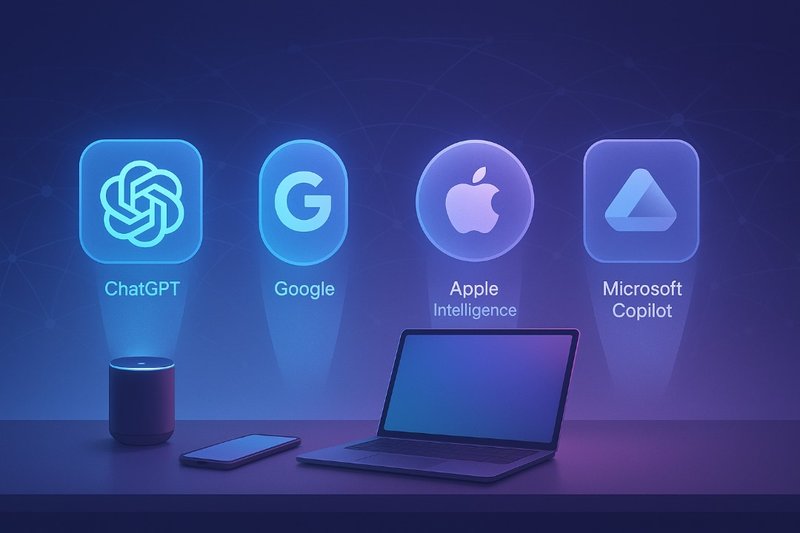Introduction: A New Era of Digital Companions
In 2025, AI-powered personal assistants are no longer just novelty voice helpers that set alarms or answer trivia questions. They’ve become intelligent, proactive, and deeply personalized digital companions that can manage entire aspects of our work, learning, travel, health, and personal lives.
With the ability to understand natural language, process images, recall long-term context, and even respond with emotional sensitivity, today’s assistants are closer to human-like interaction than ever before. Whether you use ChatGPT, Google Gemini, Apple Intelligence, or Microsoft Copilot, these tools are transforming how we live and work.
What Are AI-Powered Personal Assistants?
An AI-powered personal assistant is a software system that uses artificial intelligence to help users complete tasks, make decisions, and access information in a conversational, intuitive way.
Unlike the early days of Siri or Alexa, modern AI assistants:
- Learn from your habits and preferences over time.
- Operate seamlessly across devices—from your phone to your car’s dashboard.
- Understand multiple types of input, including text, voice, images, and even video.
- Offer proactive help rather than waiting for you to give instructions.
How AI Assistants Work in 2025
These digital companions rely on a combination of advanced technologies:
1. Natural Language Processing (NLP)
Enables the assistant to understand and respond in everyday human language—no need for robotic commands.
2. Machine Learning (ML)
Allows the system to improve accuracy, personalization, and efficiency the more you interact with it.
3. Context Awareness
Uses your location, schedule, communication history, and recent activities to provide relevant recommendations.
4. Cloud and Edge Computing
While heavy AI processing happens in the cloud, many assistants now have offline AI capabilities for speed, privacy, and reliability.
Major Advancements in AI Personal Assistants (2023–2025)
Multimodal AI
AI assistants can now process text, images, voice, and video simultaneously—making them capable of describing a picture, translating a sign, or analyzing a chart in one conversation.
Long-Term Memory
Unlike older systems, modern assistants remember details from months or years ago (with your permission), so they can follow up on previous conversations without re-explaining.
Emotional Intelligence
They can detect your tone or mood, offering encouragement during stressful times or adjusting their style for more empathy.
Seamless Integration
From controlling smart home devices to planning a multi-city trip with live travel updates, these assistants connect with almost every digital tool in your life.
Everyday Uses That Are Changing Lives
Productivity and Work
- Summarizing long reports in seconds.
- Drafting professional emails with your preferred tone.
- Managing calendars and scheduling across multiple time zones.
Accessibility and Inclusion
- Reading text aloud for visually impaired users.
- Translating spoken conversations in real time.
- Providing hands-free operation for users with mobility challenges.
Personal Growth and Learning
- Offering personalized learning plans for new skills.
- Tutoring in foreign languages.
- Assisting with creative writing, music composition, or design brainstorming.
Health and Wellness
- Reminding you to take breaks, hydrate, or stretch.
- Tracking sleep, exercise, and nutrition trends.
- Offering guided meditation or stress-reduction exercises.
Ethical and Privacy Concerns
As AI becomes more capable, the following issues demand careful attention:
- Data Privacy: Sensitive personal information needs to be encrypted and protected.
- Bias in AI Models: AI must be trained on diverse data to avoid discriminatory recommendations.
- Over-Dependence: Users risk losing decision-making skills if they rely on AI for everything.
- Transparency: Companies should clearly state when content or decisions come from AI.
The Leaders in AI Personal Assistants: A 2025 Comparison
ChatGPT
- Strengths: Exceptional at creative writing, research, brainstorming, and adapting tone.
- Best For: Students, content creators, researchers, and anyone seeking natural conversation.
Google Gemini
- Strengths: Deep search integration, live internet updates, and collaboration with Google Workspace.
- Best For: Professionals needing up-to-date information, researchers, and team collaboration.
Apple Intelligence
- Strengths: Privacy-first design, deep Apple ecosystem integration, and powerful offline capabilities.
- Best For: Users deeply invested in Apple devices and concerned about data privacy.
Microsoft Copilot
- Strengths: Enterprise productivity, automation in Excel, Word, Outlook, and Teams.
- Best For: Corporate professionals, analysts, and remote teams managing complex workflows.
The Future of AI Personal Assistants
Over the next few years, AI assistants are expected to become:
- More Proactive: Anticipating needs before you ask.
- Emotionally Supportive: Providing companionship and mental health support.
- Fully Integrated: Managing both physical and digital environments in harmony.
With these advancements, the challenge will be balancing convenience with ethics, ensuring these assistants remain tools—not decision-makers for our lives.
Conclusion
In 2025, AI-powered personal assistants are at the heart of our daily routines. Whether you choose ChatGPT for creativity, Gemini for knowledge depth, Apple Intelligence for privacy, or Copilot for business productivity, the right AI can be a game-changer in how you work, learn, and live.
The future will bring even smarter, more capable assistants—but the smartest users will be those who leverage AI as a partner, not a replacement for their own judgment.




Comments (0)
Leave a Comment
No comments yet. Be the first to comment!